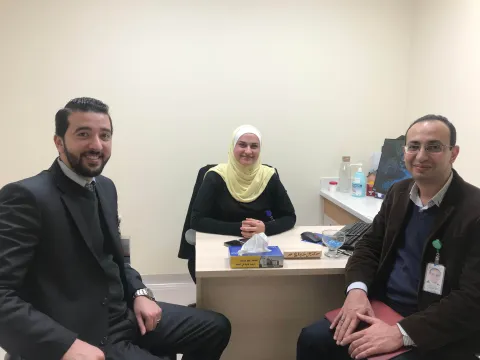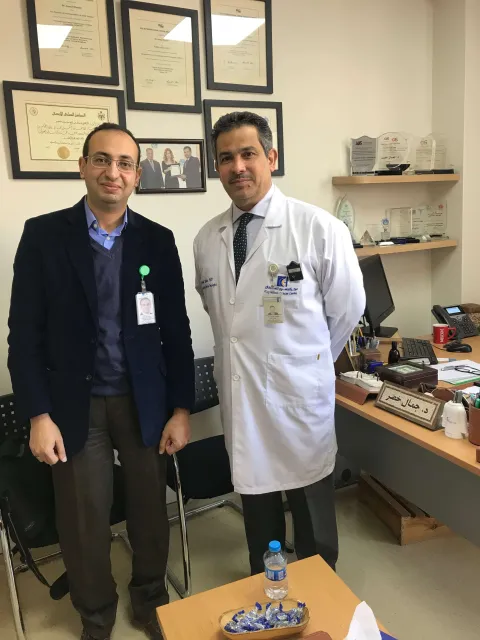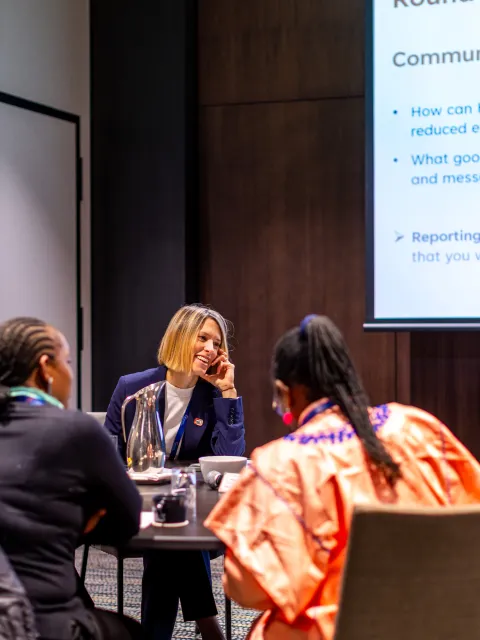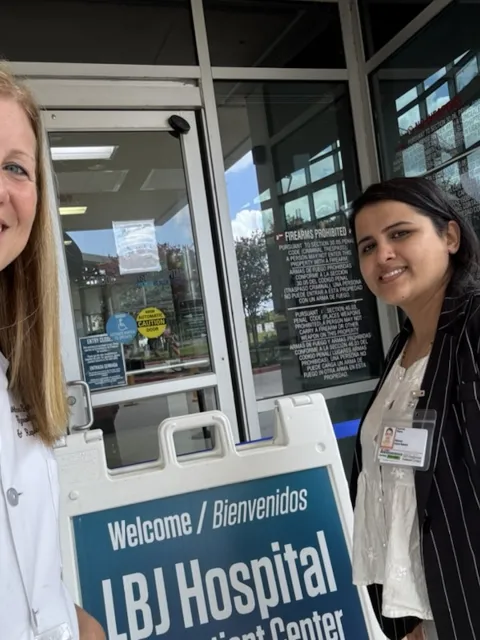Comprehensive cancer care in the Middle East

I chose to visit the King Hussein Cancer Center (KHCC) after beginning my journey as a Young Leader at the 2019 World Cancer Leaders’ Summit in Kazakhstan. I was impressed by the cancer control efforts of KHCC and how their work extended beyond Jordanians to a large number of refugees struggling to access cancer treatment and care due to the conflict that has cast a shadow over the Middle East.

Dr Ahmed Hefnawy with Mr Noor AL.deen AL.lataifeh, psychology supervisor and Ms Amal Hajaj, a social worker from the KHCC psycho-social oncology program.
Leveraging the experience at the KHCC back home
I was fascinated by what I saw at KHCC and KHCF. Firstly, I was impressed by the new patient admission clinic which focused on thoroughly evaluating the cancer patients’ condition in regard to their health status, nutrition, pain perception and psychosocial circumstances upon presentation. This comprehensive evaluation helps doctors assess any potential burdens the cancer patient may face upon the start of their treatment journey and minimise them as much as possible. I believe this is the ideal pathway that all cancer units should follow in assessing patients.
Secondly, after being welcomed by Dr Omar Shamiah, the chair of the Palliative care department, and spending a few days with the team, it was easy to see the commitment and motivation behind providing the best comfort and care to patients and their caregivers. Mornings at the centre start with the interdisciplinary team meeting of consultants, residents, nurses, home carers, clinical pharmacists and psychosocial specialists in a dynamic atmosphere of discussion aimed to continuously provide their patients and caregivers with an outstanding service even for those living far outside the capital of Amman.
Family meetings are an integral part of the service which ensures families are continuously updated about the patients’ status and care plans with shared decision making.
During my last day, I had the pleasure of attending a course the palliative care department arranged for a ‘Doctors Without Borders’ team preparing to work in a refugee camp in northern Jordan. This compassionate service provided to refugees and displaced populations, as well as Jordanians, is a role model to follow.

Dr Ahmed Hefnawy with Dr Jamal Khader, Chairman of KHCC education and training academy and UICC former board member.
“I have to say that KHCC represents the crown jewel of the kingdom of Jordan health care system. The lessons I learnt there will certainly impact the lives of cancer patients in the region”.
My goals for the future
I believe that every new skill I gain contributes to saving a cancer patient’s life, or improving their quality of life, or helping a concerned family better cope with a loved one’s condition. Improving the infrastructure to provide quality services can go hand in hand with educating other cancer professionals on how to better use their skills and limited resources. So, designing creative health care solutions to help gynecologic cancer patients in Egypt, is the next step on my path.
“We are the gang fighting cancer, we go everywhere far and wide”. HRH Princess Dina Mired, UICC President at the 2019 World Cancer Leaders’ Summit, Kazakhstan.
With the words of HRH Princess Dina Mired imprinted in my mind, I feel privileged to be part of UICC's Young Leaders program which gives me the unique opportunity to broaden my perspective, internationally collaborate and exchange experiences in the cancer control space. This global community doesn’t recognise borders and will give me a chance to provoke thoughts, incite ideas, share passion, make a difference and help patients all over the world. After all, whatever our differences in race, culture and language, as humans our challenges converge to a common enemy ‘Cancer’.
Last update
Thursday 20 August 2020Share this page


